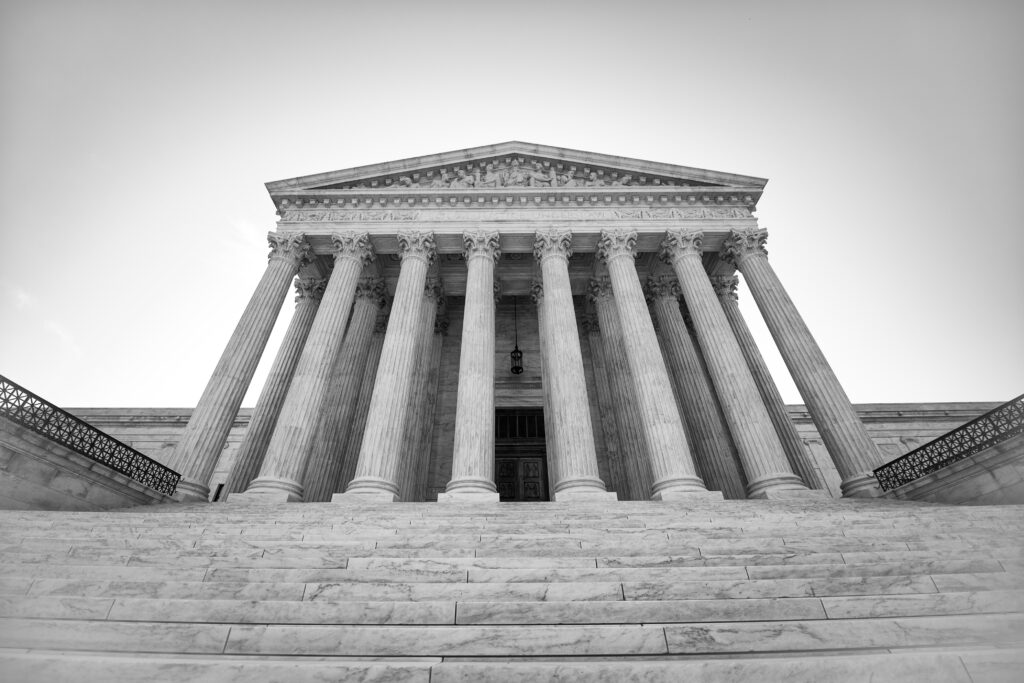
The U.S. Supreme Court will hear arguments in an Illinois lawsuit that could impact the ability of federal candidates to challenge state election laws. The case has received backing from leading right-wing anti-voting activists eager to take advantage of SCOTUS’s conservative majority to further constrain voting rights.
The plaintiffs in the case are represented by the conservative anti-voting legal group Judicial Watch. In a statement, Judicial Watch president Tom Fitton praised SCOTUS for taking the case.
“It is an injustice that the courts would deny a federal candidate the ability to challenge an election provision that could lead to illegal votes being cast and counted for two weeks AFTER Election Day,” Fitton said.
The case stems from a 2022 lawsuit filed by three Republicans — including Rep. Michael Bost (R-Ill.) — challenging Illinois’ law that allows mail-in ballots to be counted up to two weeks after Election Day, so long as they are postmarked before that day. The original lawsuit argued that Illinois’ law effectively extends Election Day and violates federal law and burdens the right to vote under the First and 14th Amendments. The plaintiffs asked a federal district court to bar Illinois election officials from counting mail-in ballots received after Election Day in future elections.
But in July 2023, a Trump-appointed district court judge dismissed the lawsuit, ruling that Bost and the two other GOP plaintiffs lacked jurisdiction because they failed to show how Illinois’ ballot receipt deadline negatively impacted their chances of winning an election. The plaintiffs subsequently appealed to the 7th U.S. Circuit Court of Appeals but the court affirmed the district court’s ruling.
In November, the GOP plaintiffs asked SCOTUS to weigh in on the case — but solely on the issue of standing. In the cert petition, Bost and the two other GOP plaintiffs argued that they have standing to sue as candidates for federal office. Their SCOTUS petition also alleged that the 7th Circuit’s dismissal of their appeal contained “serious legal errors” and uprooted precedent allowing federal candidates to challenge a state’s regulations on the time, place or manner of federal elections.
A number of right-wing election integrity and legal groups filed briefs in support of Bost and the GOP plaintiffs, in hopes that a favorable SCOTUS ruling will allow them to more easily sue to overturn state election laws — especially when it’s close to Election Day. In their brief, the conservative Public Interest Legal Foundation asked SCOTUS to settle the question of legal standing for a federal candidate to sue, as it relates to the Purcell principle — a 2006 SCOTUS order that says courts should not change any election rules too close to an election, otherwise it might confuse voters and election officials.
In a statement to The Federalist, right-wing activist and prominent election denier Cleta Mitchell also called on SCOTUS to take on the case.
“This case presents an opportunity for a badly needed course correction, and [I am] very hopeful the Supreme Court will accept the case and resolve the issue favorably in support of candidate standing to bring election cases to a court — be they Democrats, Republicans, or unaffiliated,” she said.
In an opposing brief to SCOTUS, the Illinois Board of Elections argued that Bost and the GOP plaintiffs want to challenge the law just because they are federal candidates — not because they have any proof that Illinois’ ballot receipt deadline impacted their chances of winning an election.
“They do not claim that Illinois’s ballot receipt deadline affected their likelihood of prevailing in any race in which they have ever competed or are likely to compete in the future,” the board’s brief said. “Rather, petitioners contend that they are entitled to challenge the deadline simply by virtue of their status as candidates, on the theory that a political candidate can always challenge a state’s regulation of the time, place, and manner of conducting an election.”
